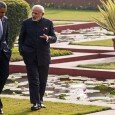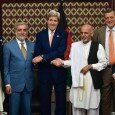By Muhammad Amir Rana –
Terrorism can only be curbed with joint Af-Pak efforts
Afghan security forces have launched a series of small-scale operations against terrorists in its eastern province, Kunner, which has become a strong base for Al-Qaeda and Pakistani terrorist groups. It is not sure that these operations can help to eradicate the terrorist networks from the other side of the border. But this is an important development indicates the prospects for broader border security cooperation between Afghanistan and Pakistan.
Afghan government took this initiative after the Army chief General Raheel Sharif visited Kabul in the aftermath of the Army public school attack in Peshawar.
Afghan provinces Kunner and Nooristan has emerged a new base for the terrorists in the region. The operation Zerb-e-Azab also pushed a big part of the terrorists’ infrastructure on the other side of the border in Afghanistan. At the same time, IS-inspired groups are also eying on the region, and they can launch movements in the IS style and try to capture towns and cities in the border regions of Afghanistan. But such attempts within Pakistan tribal region have fewer chances of success as the Pakistan military has gained control of most ungoverned territories in the tribal region, but it will remain an irritant in border security perspective.
Moreover, with Pakistan’s new military leadership reiterating its support for operation Zarb-e-Azb, the presence of U.S. troops in Afghanistan is being considered as vital to not allow Pakistani militants to find safe havens in Afghanistan. Following the signing of Afghanistan-US bilateral security pact allowing American troops to stay in Afghanistan after the end of the year, U.S. Ambassador to Pakistan Richard Olson briefed Prime Minister Nawaz Sharif on the pact and assured him of Pakistan’s reservations to be taken into account. The deal allows for the U.S. to maintain the presence in Afghanistan with 12,000 troops of U.S.-led NATO coalition to stay in Afghanistan. The previous notion of complete U.S. forces withdrawal from Afghanistan was a matter of concern for the Pakistani counterparts as border infiltration and cross-border attacks continue to be problematic for Pakistan.
The Pak-Afghan border is highly porous, and at the same time this is a difficult task for Afghan forces to dismantle the whole terrorist infrastructure from its eastern provinces. Their operational capabilities to launch conventional style operations against the terrorists are limited.
That is the challenge, which Afghanistan cannot address alone, and needs support from Pakistan. Similarly, Afghanistan needs Pakistan’s support to eliminate those groups of Afghan Taliban, which seek shelter in Pakistan and carry out attacks inside Afghanistan. With regard to that, efforts are on to defuse mistrust between Pakistan and Afghanistan so that they could jointly respond to threats to their border security as militants from both sides are increasingly concentrating along the Pak-Afghan border areas.
Afghan President Ashraf Ghani made his first state visit to Pakistan in mid-November 2014 and during his two-day visit held important meetings with Pakistani Prime Minister Nawaz Sharif, Army Chief Raheel Sharif and other top Pakistani officials. The Pakistani military said in a statement that Mr. Ghani received a briefing in General Headquarters, Rawalpindi on the situation along the two countries’ common border and that Mr. Ghani sought stronger security ties, including cooperation in training and border management, and promised his country’s cooperation “to jointly curb the menace of terrorism.”
These exchanges of visits are a step in the right direction as analysts assert that with a new civilian establishment in power in Afghanistan, it is an opportunity for both states to improve relations with another. Pakistan has repeatedly accused of India of using Afghanistan’s territory against Pakistan; this is an opportunity for Pakistan to establish healthy relations with Afghanistan, set up effective border control mechanisms and resolve problems of cross border violations which would be beneficial for both states in long run.































































































